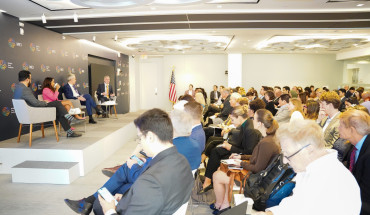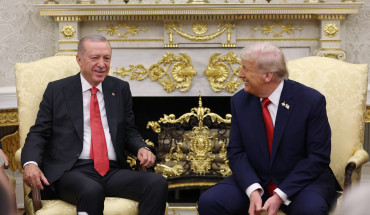This article originally appeared in Foreign Policy.
In his final address to the nation on July 2, Egypt's ousted President Mohamed Morsi mentioned electoral legitimacy 56 times. His opponents attacked him for singling out elections as the sole source of legal authority. Yet as Egypt's intelligentsia ponders a path forward, they seem to agree on only one thing: the need to hold parliamentary and presidential elections in the next few months as a way to secure both domestic and international legitimacy.
This unanimity seems perfectly logical. While free elections are not necessarily synonymous with democracy, repeated free elections are widely acknowledged as a critical component for the establishment of a stable democratic system. Elections are also considered the best method for peaceful transitions of civilian power.
Ironically, however, all indications suggest that freely held elections in Egypt may be a recipe for further conflict, with the looming question for many liberals, secularists, and government officials being just how to use the electoral mechanism in a way that provides a seal of democratic legitimacy while ensuring that it will not result in another Islamist victory.
Elections are risky business. Any electoral result necessarily produces a victor and a loser. Ideally the losers of elections respond by attempting to win future elections. In Egypt, however, the opponents of the Brotherhood who fared poorly in elections over the past two and a half years have sought to overturn electoral results through non-democratic means. Whether by way of judicial rulings, military decrees, or mass protests, the results of Egypt's elections have not been honored, with the July 3 military coup being the climax of this effort.
Since the end of the Mubarak era on February 11, 2011, the Egyptian people have been called to the polls on five different occasions. The first free vote took place on March 19, 2011, when the Egyptian electorate overwhelmingly approved proposed constitutional amendments. The Supreme Council of the Armed Forces (SCAF) responded to the result by implementing a different constitutional declaration altogether. In the second and third polls, Islamist political parties dominated the December 2011-January 2012 parliamentary elections, but the SCAF once again annulled the results by enforcing a court ruling that dissolved the lower house.
Egypt's fourth electoral experience was the presidential elections in which Mohamed Morsi narrowly prevailed in the runoff round. The constitutional referendum last December was the fifth and final vote, when voters approved the Islamist-backed constitution.
On July 3, 2013 the outcomes of the third, fourth, and fifth rounds of the Egyptian free electoral experience were annulled by a military declaration that purported to reflect the popular will of millions of street protestors. Although Egypt's short history of free elections has favored Islamist parties and agendas, the electoral losers have consistently reversed the outcomes. Rather than building effective parties and outreach campaigns, Egypt's disparate groups of liberals and Brotherhood opponents are promoting undemocratic methods to preempt future Islamist victories.
Some prominent supporters of Morsi's overthrow have called for the creation of a constitutional principle that bans "parties based on religious foundation." Such a ban would exclude Islamist parties, but an even more insidious issue underscores much of the liberal discourse on how to get around the Brotherhood.
In an interview with the U.S.-based PBS channel, Mohamed ElBaradei said: "Today, we have an educated middle class on the one hand, and on the other a majority known as Islamists and illiterates." Similarly, the prominent Egyptian writer Alaa al-Aswany recently stated that "Illiterates are our people and we respect them. But they are voting on issues they cannot read. Should we glorify illiteracy or admit it is an obstacle?"
According to this line of thought, some secularists are hoping to prevent Islamist electoral victories by disenfranchising Egypt's illiterate population. While Egypt's conflict is frequently portrayed as an identity struggle between Islamists and secularists, it might be more apt to understand it as a hybrid conflict involving class and religion. Illiteracy is a challenge to democratic processes in Egypt, yet the position articulated by ElBaradei and Aswany suggests a dangerous turn by those claiming to uphold liberal values. Moreover it would be absurd to use this proxy target for the failure of the secular and liberal parties to organize successfully and attract poor and marginalized voters (Egypt's "silent majority").
By cultivating support from poor and disadvantaged voters, Islamist parties have received on average more than two thirds of the votes in every poll since the 2011 revolution. If liberal and anti-Brotherhood groups want their political visions to prevail through legitimate democratic means, they must adopt new strategies that will allow them to win elections, without disenfranchising or effectively excluding millions of Egyptian voters.
First, liberal parties must incorporate a strong program of social justice -- a platform neglected by the previous government and continually underserved by the various political forces in Egypt. Second, liberals must coalesce into a unified movement that combines social justice with liberal democratic principles. Given the existence of over a dozen liberal parties and several movements not registered as parties, unity amongst liberals is a major challenge. Most of these movements are Cairo-based and therefore must expand their reach into rural areas if they seek to compete with Islamist parties.
Further complicating these efforts, the anti-Islamist vote is divided between those who truly believe in the values of the January 25 revolution, the "liberals," and those who prefer "stability" over change in the style of a military/police state. In addition to defeating Islamists in upcoming elections, liberals must also prevail over the anti-change parties to avoid becoming the fig leaf that conceals the reinstatement of the old military dictatorship.
Democracy relies on belief in the system, and a key component of belief in democracy is faith that elections are binding. As long as Egyptians keep using other means to reverse the outcomes of electoral processes, political forces of all varieties will have little trust in elections and thus little impetus to invest their efforts in change within the system. Thus Egypt's chaos and instability will likely last unless free and fair democracy asserts itself in yet another wave of political transition.
The Middle East Institute (MEI) is an independent, non-partisan, non-for-profit, educational organization. It does not engage in advocacy and its scholars’ opinions are their own. MEI welcomes financial donations, but retains sole editorial control over its work and its publications reflect only the authors’ views. For a listing of MEI donors, please click here.













